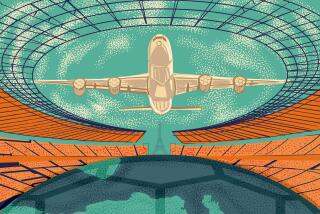Change of Mind Saves Tennis Player Rossetâs Life
Marc Rosset moved across the bright, busy plaza outside Arthur Ashe Stadium, his friend Andrei Medvedev at his side, the two of them out there looking for Rossetâs coach. Just a couple of big young guys with the rest of the afternoon wide open for them at the U.S. Open. This was the day after the crash of Swissair 111, which was supposed to be Rossetâs flight home.
Rosset decided not to go home to Switzerland Wednesday night, even though he had lost in the first round and was out of the Open. He decided he would stay around for one more day of practice at the National Tennis Center, one more night in New York. This is how a first-round loss in tennis did not end up as a death sentence. Here in the sun-splashed plaza of the U.S. Open the next day, with cheers coming from all directions, was one survivor of Swissair 111.
Rosset had just told his story in the interview room, but one more reporter caught up with him outside, wanting to know for sure when Rosset decided to change his reservation.
âThe night before,â Rosset said again.
He wore a âLipton â97â T-shirt and looked exhausted. Rosset said he had watched CNN all night, transfixed by the terrible pictures of the flight not taken. Now, he turned to Medvedev and managed a smile, on a day when he did not know whether he should smile or not, laugh or cry.
âIâm looking for a boat to Geneva,â Rosset said.
Medvedev smiled at the reporter and said, âRemember, you are talking to a ghost.â
Rosset and his coach, Pierre Simsolo, were originally booked on Flight 111. Simsolo was ready to leave after Rosset lost his first-round match to Dominik Hrabaty of Slovakia on Monday. Rosset, who won a gold medal in tennis at the Barcelona Olympics and once got as high as No. 9 in the world, was not entered in the doubles.
Once you are officially out of a big tournament like the Open, you have very few rights where practice courts are concerned. Rosset originally thought that if he wanted to get some real work done, he could do it better at home.
So he was on Flight 111, and then he was not. You want to make God laugh? Tell Him about your plans.
âI said, âOK, maybe go for practice tomorrow,â â he said in the interview room, his former mixed-doubles partner Martina Hingis listening from the third row of chairs. â(I said) âWe are going to leave on Thursday.â â
There was a brief pause, and then Rosset said, âBut, you know, itâs the kind of discussion that I could have said, âWe fly tomorrow and thatâs it.â â
Rosset was out to dinner with friends when the plane went down.
He went back to his hotel and another friend called and the friend said he better turn on CNN, the flight Marc Rosset was supposed to take never made it to Geneva.
âIt was a strange feeling when you realize that just for changing your mind, you are still alive,â Rosset said.
Rosset and all the young athletes like him fly all over the world, all the time, because that is part of these charmed lives we believe they lead. They go to the next tournament, the next payday, or they go home.
Some never make the next stop. Rafael Osuna, the great Mexican player who won the U.S. championship in 1963, died in a plane crash in 1969. Joe Hunt, the â43 U.S. champion, died in a routine training mission over Daytona Beach, Fla., in â45.
And then there are the lucky ones, like Rosset. Derrick Rostagno, who beat Jimmy Connors once at Wimbledon, canceled himself off a flight from Mexico City that crashed in 1986. In the end, some of these lives in sports are more charmed than others.
âYou think about stuff like this all the time,â Pete Sampras said before his match Thursday.
His own family was waiting. His mother and father, home in Switzerland, heard of the crash long before he did but did not know if he was on the flight or not, did not know where to reach him in New York.
Rosset finally spoke to them about 2 a.m. New York time, with the television set still on and the news about Flight 111 getting worse and worse.
âWhen (your parents) wake up, and you just turn on the news and you see that the airplane from New York to Geneva just crashed, you always think your son is on the plane,â Rosset said. He was not on the plane.
The news at the Open about Flight 111 was about a survivor. When Rosset finally finished in the interview room, Hingis--who also calls Switzerland home--kissed him sweetly on the cheek.
Then Rosset was moving out the front door of Ashe Stadium, into the sunlight, Medvedev calling him âGhostâ the first time, a television cameraman walking in front of him, Rosset famous on this day for the wrong reasons, his one last day in New York and the first day of the rest of his life.
âI donât think I am going to fly tonight,â Marc Rosset said.
More to Read
Go beyond the scoreboard
Get the latest on L.A.'s teams in the daily Sports Report newsletter.
You may occasionally receive promotional content from the Los Angeles Times.






